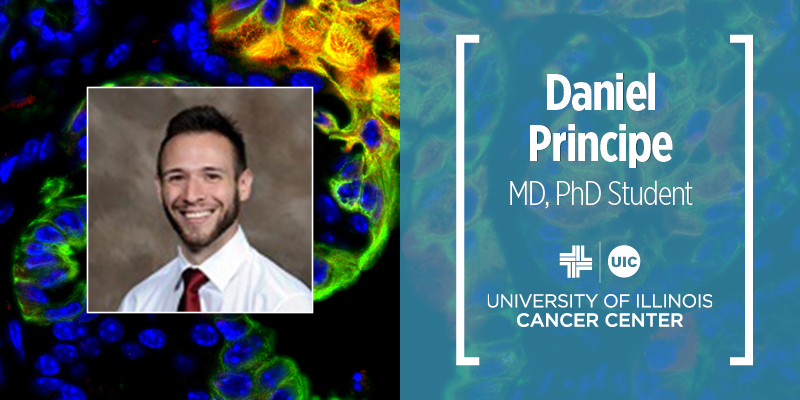
Daniel Principe is working to make the words ‘pancreatic cancer’ less foreboding.
“Pancreatic cancer has a dismal prognosis, with a median survival time of six to 12 months,” said Principe, a MD/PhD student at the University of Illinois College of Medicine who has received a Ruth L. Kirschstein National Research service F30 award from the National Cancer Institute (NCI) to fund a research project on the disease. “This is largely attributed to the cancer being diagnosed late and the disease becoming resistant to standard of care treatment regimens.”
When used alone, checkpoint inhibitors – immunotherapy drugs that help the body recognize and attack cancer cells – have been successful in managing other cancers, but it has been ineffective in fighting pancreatic ductal adenocarcinoma (PDAC), the most common and lethal form of pancreatic cancer, Principe said.
As an alternative to using standard treatment options, Principe, along with Ajay Rana, PhD, Endowed Professor and Director of Research in the Department of Surgery at the University of Illinois College of Medicine and co-leader of the UI Cancer Center’s Translational Oncology Program, will conduct a series of experiments combining chemotherapy with an inhibitor of the immune checkpoint PD-1 (anti-PD-1) and Galunisertib, an inhibitor of Transforming Growth Factor Beta signaling. So far, this combination has been highly effective in controlling tumors in mice by reinvigorating T lymphocytes.
In two recently published studies conducted by Principe in Rana’s laboratory (one in Cancer Research, the second in Molecular Cancer Therapeutics), mice receiving both anti-PD-1 and Galunisertib had a survival advantage of several months compared to controls, and the addition of chemotherapy allowed terminally ill mice to survive almost indefinitely.
“Combined, these data suggests that blocking the Transforming Growth Factor Beta pathway renders these tumors responsive to immune checkpoint inhibition, particularly when combined with chemotherapy, and may be a reasonable approach to overcoming drug resistance in PDAC,” Principe said.
Pancreatic cancer accounts for about 3% of all cancers in the United States, and roughly 7% of all cancer deaths, according to the American Cancer Society. About 57,600 people (30,400 men and 27,200 women) will be diagnosed with the disease this year, and about 47,050 people (24,640 men and 22,410 women) will die from the cancer.
A native of the Chicago suburb of Vernon Hills, Principe had no intention of entering the field of medicine. He was, he said, an “underperforming student.” In his third semester at Loyola University, having transferred to the Chicago school from a local community college, Principe needed to fulfill a biology requirement. With the deadline looming, he enrolled in the only open course that fit into his schedule: Embryology, taught by a Nobel Prize nominated researcher.
“The professor was unwilling to accept my lackadaisical attitude and very bluntly suggested I was not smart enough for his course,” Principe said. “I set out to prove him wrong. I applied myself in a way that I had never done before. I found myself taking a genuine interest in the subject matter, and became motivated more by my own curiosity rather than defeating my professor.”
Once the course had ended, the professor told Principe he was confident he would succeed, that he “just needed a push.” A friendship grew, and the professor helped guide Principe throughout the remainder of his undergraduate career and eventually into research.

Following his graduation from Loyola with a degree in biology, Principe was interested in pursuing a career in biological research. However, he was conflicted as to whether to enter the field of research or medicine. He enrolled in Northwestern University’s biomedical engineering master’s program to help him decide, focusing on pancreatic cancer while working part-time at the Kellogg Cancer Center. Enjoying both equally, Principe applied to the University of Illinois College of Medicine’s MD/PhD program.

Needing a letter of recommendation for the application, Principe sought out his old Loyola professor who started him on his path to research. When he returned to campus to visit with his former mentor, Principe learned that the man he admired was diagnosed with end-stage pancreatic cancer. The educator eventually succumbed to the horrific illness.
“He was such an integral part of my life that I dedicated my first article in his memory,” Principe said. “After enrolling in the Medical Scientist Training Program at the College of Medicine, I chose to continue studying pancreatic cancer, and he is certainly part of the reason why. By focusing my research on answering important, clinically relevant questions, I hope to someday translate my findings to patient care so it will improve outcomes and reduce morbidity in what is widely considered an untreatable disease.”
